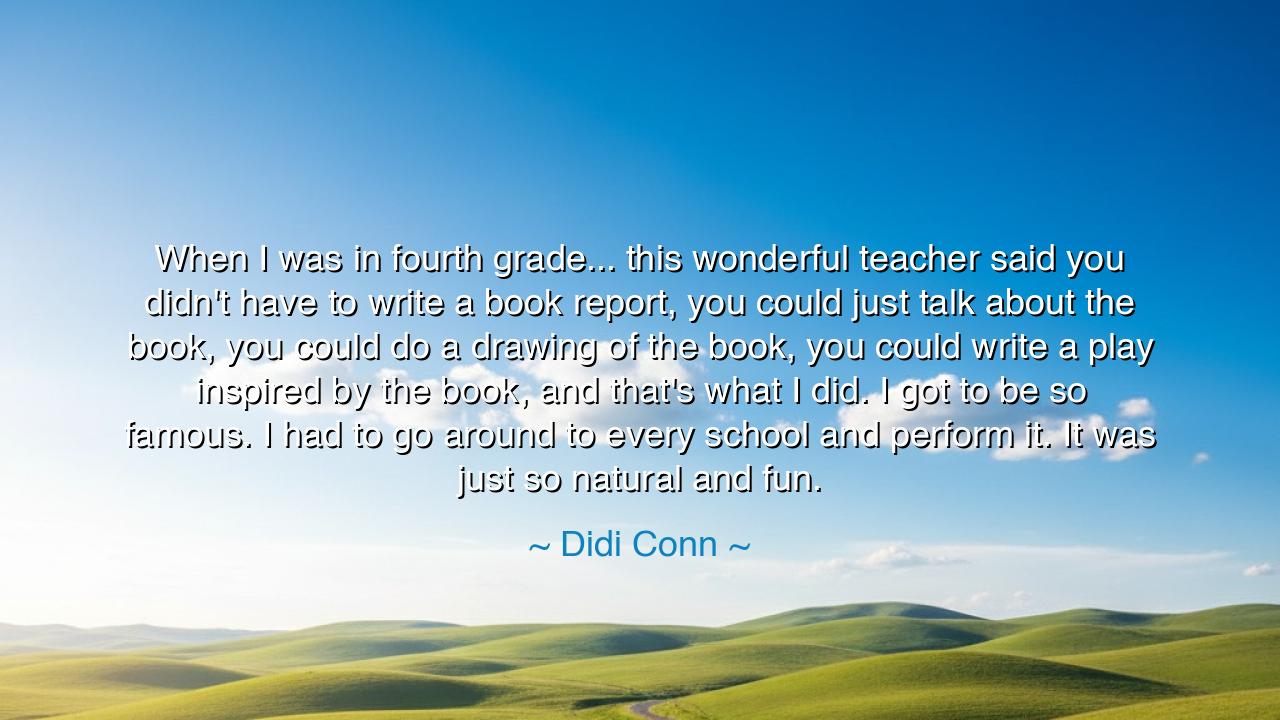
When I was in fourth grade... this wonderful teacher said you
When I was in fourth grade... this wonderful teacher said you didn't have to write a book report, you could just talk about the book, you could do a drawing of the book, you could write a play inspired by the book, and that's what I did. I got to be so famous. I had to go around to every school and perform it. It was just so natural and fun.






Hear, O seekers of wisdom, the bright and playful words of Didi Conn: “When I was in fourth grade... this wonderful teacher said you didn’t have to write a book report, you could just talk about the book, you could do a drawing of the book, you could write a play inspired by the book, and that’s what I did. I got to be so famous. I had to go around to every school and perform it. It was just so natural and fun.” In this memory lies the deep truth of what it means to nurture the spirit of a child—that creativity blossoms not under rigid command, but under the freedom to express in one’s own way.
The teacher, wise and compassionate, did not demand that every child follow the same narrow path. Instead, she opened the door to imagination, saying, “Speak, draw, act—find your way.” And in that freedom, young Didi discovered her voice. She was not forced to confine her mind to a report of pages, but was allowed to let her soul pour forth in performance. This was no mere assignment; it was the birth of an artist. Thus, her story teaches that one teacher, with one act of openness, can shape the entire destiny of a student.
Consider how often greatness has emerged when freedom was granted. Michelangelo, as a boy, was first scolded by his father for wasting time drawing. Yet when a teacher recognized his gift and placed chisel in his hand, the world gained the Sistine Chapel. Or think of Albert Einstein, whose mind wandered from rigid lessons, but who thrived when allowed to imagine thought experiments—riding beams of light, bending the fabric of space and time. In every age, it is creative freedom that awakens true genius.
This story is not only about art, but about the joy of learning. Didi Conn remembers that it was “so natural and fun.” Learning, when done rightly, should feel like play. It should not crush the spirit, but lift it. Too often, education becomes a cage of rules, where curiosity is strangled by uniformity. Yet here, a teacher transformed a book report into a festival of imagination, and in doing so, unlocked the confidence and delight of a child.
The lesson shines clearly: teachers, parents, and leaders must grant space for expression. Not every child will shine with words on paper; some will speak, some will draw, some will act, some will build. To demand one form is to silence countless voices. To open many doors is to let every child find their gift. The greatness of the teacher is not in commanding sameness, but in recognizing difference.
Practical wisdom follows. If you are a teacher, do not bind all your students to one path—let them discover new ways to show what they know. If you are a parent, honor the strange, the silly, the creative impulses of your child—they may be seeds of destiny. And if you are a learner yourself, seek always to approach your tasks not only with duty, but with joy. Ask yourself: how can this be fun? How can I express this truth in a way that is natural to me?
Thus, O children of tomorrow, remember Didi Conn’s lesson: freedom awakens talent, and joy awakens purpose. A single teacher, with kindness and imagination, can light the spark of a lifetime. Therefore, live not in rigid patterns, but in the dance of creativity. Teach, learn, and create in ways that bring delight. For in delight, true greatness is born.






AAdministratorAdministrator
Welcome, honored guests. Please leave a comment, we will respond soon